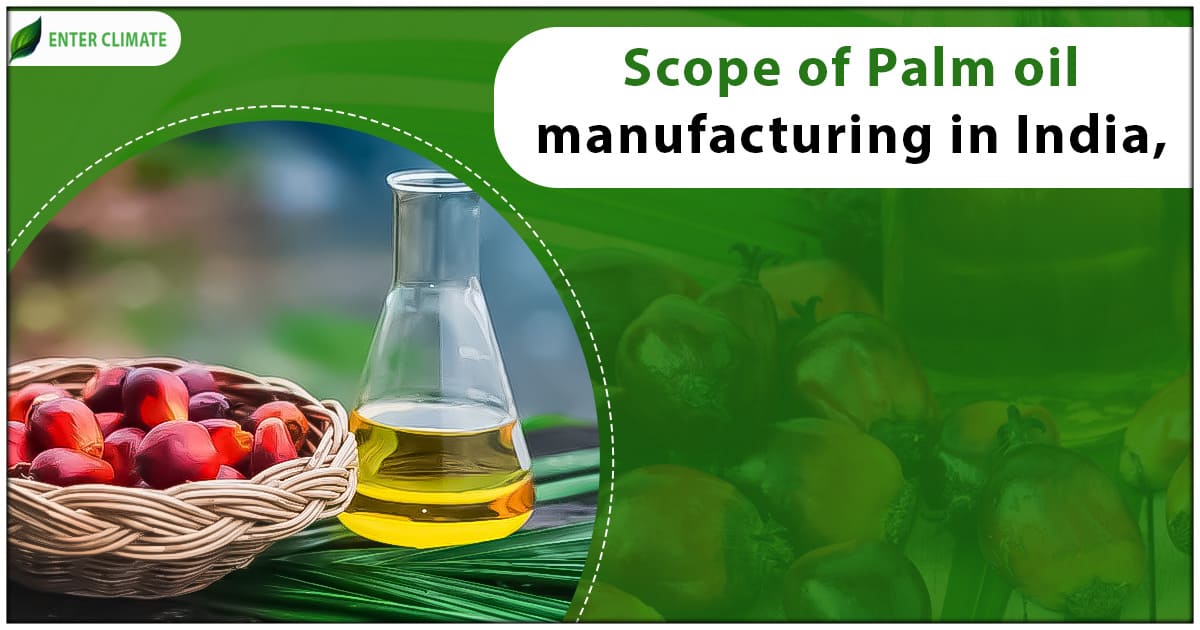Scope of Palm Oil Manufacturing in India
 26 Jun, 2023
26 Jun, 2023 
Palm oil, a widely used vegetable oil found in various products ranging from soaps to ketchup, is significant in the global market. India, currently the world’s most populous country and the fifth-largest consumer market, unsurprisingly relies heavily on this commodity. Therefore, there is enormous scope of Palm oil manufacturing in India. Imports account for over 90 per cent of India’s palm oil demand, while domestic production only covers a meagre 2.7 per cent. As a result, India is now determined to bolster its domestic palm oil production substantially, aiming to achieve self-sufficiency in meeting its palm oil demand. The Indian government has recently initiated a program called the National Mission on Edible Oils – Oil Palm (NMEO-OP) to promote oil palm cultivation. This mission, launched as a new centrally sponsored Scheme, mainly emphasises the Northeast region and the Andaman and Nicobar Islands.
Significance of Palm Oil in the Edible Oil Market
Oil palm cultivation is crucial for increasing the availability of domestic edible oil[1], as it is the most productive perennial crop in terms of oil yield. The oil palm tree yields both edible palm oil and palm kernel oil. With proper planting material, irrigation, and management, oil palm can produce 20-25 metric tons of fresh fruit bunches (FFB) per hectare after reaching the age of 5.It can produce 4-5 metric tons of palm oil and 0.4-0.5 metric tons of palm kernel oil (PKO).
- In comparison, the yield of palm oil is five times higher than that of edible oil obtained from traditional oilseeds.
- Palm oil is a significant commodity in the global market for edible oils and fats, currently the largest source of vegetable oil worldwide.
- Despite utilising only 10 per cent of oilseed production farmlands, global palm oil cultivation accounts for 35 per cent of the total volume of all vegetable oils.
- Palm oil is vital in generating export revenue for producing countries due to the increasing global demand for vegetable oils.
- Particularly for India, the consistent yield of palm oil once the crop matures holds great scope of Palm oil manufacturing in India for improving farmers’ livelihoods.
Market Potential of Palm Oil Manufacturing in India
As per the Indian Institute of Oil Palm Research’s findings, the scope of Palm oil manufacturing in India is as follows:
- India’s annual demand for palm oil amounts to 25 million tons.
- The country currently produces approximately 10 million tons domestically and imports 15 million tons from other nations.
- Palm oil production in India currently spans over 3 lakh hectares of land, and there are plans to expand cultivation to an additional area of 6.5 lakh hectares by the year 2025-26.
Palm oil cultivation in India
- Scope of Palm oil manufacturing: Cost competitiveness:
- Compared to other oil crops, oil palm exhibits high yields, easy cultivation, and year-round fruit production.
- Oil palm can generate 10 to 46 times more oil per hectare than other oilseed crops, with an average yield of around 4 tons per hectare.
- Detailed analysis indicates that the country’s production of 4 million metric tons of traditional oils requires 15.80 million hectares of land. In contrast, the same quantity of palm oil could be produced from just 1 million hectares.
- Scope of Palm oil manufacturing: Untapped potential:
- According to the Indian Institute of Oil Palm Research (IIOPR), India has a potential land area of 28 lakh hectares for palm oil production, with over 9 lakh hectares located in the northeastern region.
- Currently, only 3.70 lakh hectares are dedicated to oil palm cultivation.
- Scope of Palm oil manufacturing: Climate change management:
- Oil palm cultivation contributes to carbon sequestration, making it an attractive crop in terms of climate change management.
- Scope of Palm oil manufacturing: Export potential:
- Palm oil has emerged as the primary global source of vegetable oil due to its widespread availability, versatile usage, and lower cost than other vegetable oils.
- Palm oil constitutes 33% of the world’s vegetable oil production mix.
- The global demand for vegetable oils is projected to increase by 46% by 2050.
- Lower capital requirements:
- Oil palm cultivation is accessible to small-scale farmers without substantial capital investments in land or heavy machinery.
- The dominance of small farmers in Indonesia, Malaysia, and Thailand, with over 3 million farmers involved, exemplifies this aspect.
Initiative to promote palm oil production
National Mission on Edible Oil-Oil Palm (NMEO-OP):
This scheme aims to achieve self-reliance in edible oil, with a total allocation of Rs. 11,040 crores over five years.
Targets:
- The scheme aims to increase domestic palm oil production threefold to 11.20 lakh tonnes by 2025-26 and further to 28 lakh tonnes by 2029-30.
- An additional 6.5 lakh hectares will be dedicated to palm oil cultivation by 2025-26, with a long-term goal of reaching 10 lakh hectares.
Special focus:
- The scheme places particular emphasis on the Andaman and Nicobar Islands and the Northeastern region of India.
Price assurance:
- Farmers who cultivate palm oil under this mission will receive price assurance from the government, protecting them from price fluctuations.
- This assurance is set at 14.3% of the price of crude palm oil (CPO) and operates similarly to the Minimum Support Price mechanism.
- The scheme includes a sunset clause that expires on November 1, 2037.
- The price assurance provided to farmers is the Viability Price (VP).
Manufacturing practice
A sustainable model of the scope of Palm oil manufacturing in India; Indian Palm Oil Sustainability (IPOS) Framework:
- The Indian Palm Oil Sustainability (IPOS) Framework aims to establish a comprehensive set of guidelines encompassing social, economic, environmental, and agronomic aspects of palm oil production and trade.
- It is a sustainability framework developed by the Indian industry specifically for the Indian industry, guiding and promoting sustainable practices in palm oil production and trade.
Licences and Documents
The licenses and documents needed for the palm oil industry are:
- Business Registration: Registering the business with the appropriate authorities as per the law is mandatory. This registration makes the business eligible for certain government benefits.
- Consent NOC: Owners of edible oil and vanaspati industry planning to operate or establish an industrial plant must obtain Consent NOCs (No Objection Certificates). The respective State Pollution Control Boards issue these in two steps: Consent to Operate (CTO) and Consent to Establish (CTE). Some boards may issue a Consolidated Consent Authorization (CCA). Compliance with provisions of the Environment Protection Act, Water Act, and Air Act is necessary for setting up a mill. The required documents for this NOC include the following:
- Completed application form of the specific State Pollution Control Board (SPCB)
- Site or layout plan with road access
- Detailed project report
- Details of the manufacturing and finished products
- Details of waste management and pollution control measures in place
- List of machinery and capital cost of the unit (land, building, and plant machinery)
- Water balance, water source, and required quantity
- Land documents such as rent/lease agreement
- Industry registration documents
- Consent fee (if applicable)
- Certified balance sheet by a Chartered Accountant (CA)
- Laboratory report of trade emissions and effluents
- Copy of any required permission from the State Government, such as environmental clearance
- Any additional documents specified in the application form
- FSSAI License: The edible oil and vanaspati industry must obtain the necessary trade and food business licenses from India’s Food Safety and Standards Authority (FSSAI). The documentation required for the FSSAI license includes the following:
- Photo ID
- List of proposed food articles
- Completed Form-B by the applicant
- Partnership deed/Certificate of Incorporation (COI)/Memorandum of Association (MOA)/Articles of Association (AOA)
- Lease or rental agreement to establish land ownership
- Food Safety Management System (FSMS) plan
- Supporting documents (if any), such as NOC from the panchayat/municipality or health NOC
- List of raw material suppliers
- List of machines and equipment
- List of directors and partners
Additional licenses and permits required for the edible oil and vanaspati industry may include:
- Trade license from local authorities
- SSI or MSME registration with Udyog Aadhaar Registration (if applicable)
- Trademark registration
- GST registration for tax purposes
- IEC (if planning to export the finished product)
BIS certification
Success stories from Southeast Asia:
Indonesia and Malaysia, two Southeast Asian countries, have been significant examples of successful oil palm cultivation. Indonesia has emerged as a prominent palm oil hub, surpassing Malaysia, with the two countries accounting for 80% of global oil palm production.
Conclusion
Concerns regarding health hazards associated with trans-fatty acids (TFA) and genetically modified organisms (GMOs) have boosted the demand for palm oil, as it is not derived from GMOs and does not contain TFA. There is a significant opportunity and scope of Palm oil manufacturing in India. The Indian government recognises the importance of achieving self-reliance in edible oil production, and palm oil cultivation has been identified as a key crop towards achieving this goal. With its high oil yield, year-round fruit production, and potential for sustainable cultivation, palm oil offers a cost-competitive and efficient solution to meet the increasing demand for edible oils in India. To start your business of Palm oil manufacturing in India, it is suggested to take expert advice on the same, to comply with all the legalities and regulations and have a hassle-free experience.
FAQ
Palm oil manufacturing is crucial in achieving self-reliance in edible oil production for India. As the country’s largest consumer of edible oils, reducing dependence on imports and increasing domestic palm oil production can enhance food security and reduce the vulnerability to supply chain disruptions. By expanding palm oil manufacturing, India can decrease its reliance on foreign markets and meet a significant portion of its edible oil demand domestically.
The Indian Palm Oil Sustainability (IPOS) Framework aims to establish a comprehensive set of guidelines encompassing social, economic, environmental, and agronomic aspects of palm oil production and trade.
The basic requirements are a Favourable Climate (Temperature of 20 to 40 degree Celsius) (75-100% humidity).
India is the world’s biggest importer of Palm oil.
Indonesia, Malaysia and Thailand are the biggest exporters of palm oil to India
Read our Article: How to start an Essential oil manufacturing business?












